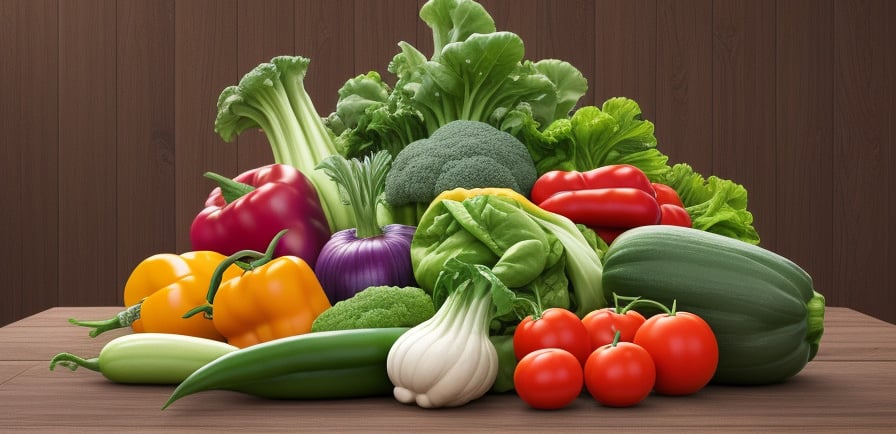Comparing the Health Benefits of Frozen Vegetables and Freshly Bought Vegetables
VEGETABLES


Introduction
When it comes to maintaining a healthy diet, incorporating vegetables is essential. However, the debate between the health benefits of frozen vegetables and freshly bought vegetables often arises. While both options have their advantages, it is important to understand the differences and make an informed decision. In this article, we will compare the nutritional content, convenience, cost, and environmental impact of frozen vegetables and freshly bought vegetables to determine which option is healthier.
Nutritional Content
One of the key factors to consider when comparing frozen vegetables and freshly bought vegetables is their nutritional content. Freshly bought vegetables are typically harvested when they are ripe and at their peak freshness. This means they may contain higher levels of certain vitamins and minerals compared to their frozen counterparts.
On the other hand, frozen vegetables are often processed shortly after being harvested, which helps to retain their nutritional value. The freezing process can help preserve important nutrients, such as vitamin C and folate, which are susceptible to degradation during storage and cooking. Additionally, frozen vegetables are often picked at their peak ripeness, ensuring that they are packed with essential nutrients.
While fresh vegetables may have a slight edge in terms of certain nutrients, frozen vegetables can still provide a significant amount of vitamins and minerals. The difference in nutritional content between the two options is generally minimal and may vary depending on the specific vegetable and the length of time between harvest and consumption.
Convenience
Another factor to consider when comparing frozen vegetables and freshly bought vegetables is convenience. Frozen vegetables are pre-cut, pre-washed, and ready to use, making them a convenient option for quick and easy meal preparation. They eliminate the need for washing, peeling, and chopping, saving valuable time in the kitchen.
On the other hand, freshly bought vegetables require more preparation before they can be cooked. They need to be washed, peeled, and sometimes chopped, which can be time-consuming, especially for busy individuals. However, some people enjoy the process of preparing fresh vegetables and find it therapeutic.
In terms of availability, frozen vegetables are available year-round and can be stored in the freezer for an extended period. This makes them a convenient option when certain vegetables are out of season or not readily available in local markets. Freshly bought vegetables, on the other hand, may be limited by seasonal availability and may not be as easily accessible.
Cost
Cost is another important consideration when comparing frozen vegetables and freshly bought vegetables. In general, frozen vegetables tend to be more cost-effective than their fresh counterparts. This is because frozen vegetables can be purchased in bulk and stored for an extended period without spoilage. They also eliminate the risk of wasting vegetables that may go bad before they can be consumed.
On the other hand, freshly bought vegetables are often priced higher, especially when they are out of season or sourced from organic farms. The cost of transportation and storage for fresh vegetables can also increase their overall price. However, it is worth noting that the cost of vegetables can vary depending on the region, availability, and specific vegetable type.
Environmental Impact
The environmental impact of our food choices is an important consideration in today's world. When comparing frozen vegetables and freshly bought vegetables, it is essential to assess their environmental footprint.
Frozen vegetables have the advantage of reducing food waste. They can be stored for a longer period, reducing the likelihood of spoilage and the need for frequent grocery shopping. Additionally, the freezing process itself requires less energy compared to other methods of food preservation.
On the other hand, freshly bought vegetables often have a lower carbon footprint as they do not require the energy-intensive freezing process. However, they may contribute to food waste if they are not consumed before they spoil. Additionally, the transportation of fresh vegetables from farms to markets can result in greenhouse gas emissions.
Conclusion
Both frozen vegetables and freshly bought vegetables have their advantages and can be part of a healthy diet. While freshly bought vegetables may have a slight edge in terms of nutritional content, frozen vegetables still provide a significant amount of essential vitamins and minerals. Frozen vegetables offer convenience, cost-effectiveness, and a reduced environmental impact through reduced food waste. Ultimately, the choice between frozen and fresh vegetables depends on individual preferences, availability, and specific dietary needs. It is important to prioritize a varied and balanced diet that incorporates a combination of both options.
